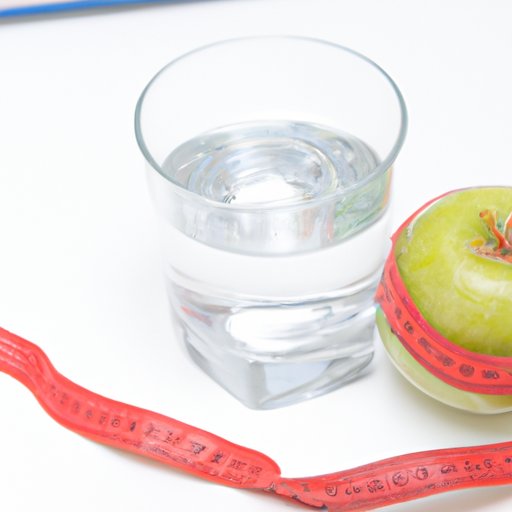
Introduction
Water weight, also known as edema, is a common concern for many people. It’s the temporary retention of fluids in the body, which can cause bloating, puffiness, and discomfort. While water weight gain is usually harmless, excessive retention can have negative effects on health and well-being. In this article, we’ll explore the science behind water weight, how long it typically lasts, and ways to manage and reduce it.
The Science behind Water Weight: How Long Does it Really Last?
Water weight is the excess fluids that accumulate in the body’s tissues or cavities. It’s different from actual weight gain, which occurs when the body stores fat or builds muscle. Many factors can influence water weight retention, including sodium intake, hormonal changes, dehydration, and certain medications. The duration of water weight can vary depending on individual factors, such as weight, age, and lifestyle. In general, water weight usually lasts for a few days to a week.
5 Simple Ways to Lose Water Weight in One Week
While water weight gain is usually harmless, it can be uncomfortable and affect self-esteem. If you’re looking for ways to reduce water weight quickly, here are some practical tips. First, drink more water to support fluid balance and flush out excess fluids. Second, avoid salty foods that can contribute to water retention. Third, exercise regularly to improve circulation and lymphatic drainage. Fourth, limit your alcohol and caffeine intake as they can dehydrate the body. Finally, consider taking natural diuretic supplements to promote urination and reduce bloating. It’s important to note that these tips are not a substitute for a healthy diet and lifestyle and should only be used temporarily to alleviate discomfort or achieve short-term weight loss goals.
What’s Normal? Understanding Water Weight and its Duration
It’s normal for the body to fluctuate in weight and water retention. The amount of water weight that’s considered healthy varies depending on individual factors such as age, gender, and activity level. Generally, women tend to have more water weight than men due to hormonal changes. Athletes and active individuals may also have higher water weight due to increased muscle mass. In contrast, sedentary individuals may have lower water weight. It’s important to pay attention to your individual body and consult a healthcare provider if you have concerns about your weight or water retention.
Water Weight and Bodybuilding: Addressing the Myth
In bodybuilding, some people believe that water weight retention is necessary for building muscle mass and achieving a ripped look. However, this is a common myth. While water can help to enhance muscle definition, excessive water retention can actually detract from it. Moreover, retaining excessive water can lead to health problems such as edema and dehydration. Bodybuilders looking to reduce water weight should focus on a healthy diet and exercise program that promotes overall wellness and performance.
Is Water Weight a Sign of Something More Serious?
While water weight is usually harmless, excessive retention can be a symptom of an underlying health problem such as kidney disease, liver disease, or heart failure. It’s important to consult a healthcare provider if you experience any warning signs such as sudden weight gain, swelling, shortness of breath, or fatigue. Your healthcare provider can help to identify the cause of your water weight and recommend appropriate treatment.
Managing Water Weight: How to Get Rid of That Puffy Feeling
Aside from the tips mentioned earlier, other ways to manage water weight include getting enough sleep, reducing stress, and getting a lymphatic massage. Lymphatic massage is a gentle massage technique that stimulates the lymphatic system and promotes lymphatic drainage. It can help to alleviate fluid buildup and reduce the appearance of cellulite. Diuretic medications may also be prescribed by a healthcare provider to promote urination and reduce fluid retention. It’s important to work with your healthcare provider to find the best approach for your individual needs.
The Role of Diet in Reducing Water Weight: Expert Advice
Diet plays a significant role in water weight retention and loss. To reduce water weight, it’s advisable to eat a balanced diet with plenty of fruits, vegetables, and whole grains. These foods are high in fiber and nutrients, which promote satiety and support overall health. In addition, foods high in potassium, such as bananas, sweet potatoes, and spinach, can help to balance sodium levels in the body and reduce fluid retention. Avoiding processed foods, high in sodium and too much caffeine and alcohol is also recommended.
Conclusion
Water weight is a common occurrence that affects many people. While it’s usually harmless, excessive retention can lead to discomfort and health problems. Understanding the science behind water weight and implementing healthy habits like drinking more water, eating potassium-rich foods, and exercising regularly can help to reduce water weight and improve overall health. If you experience any warning signs or have concerns about your water weight, it’s important to consult with a healthcare provider for proper evaluation and treatment.




